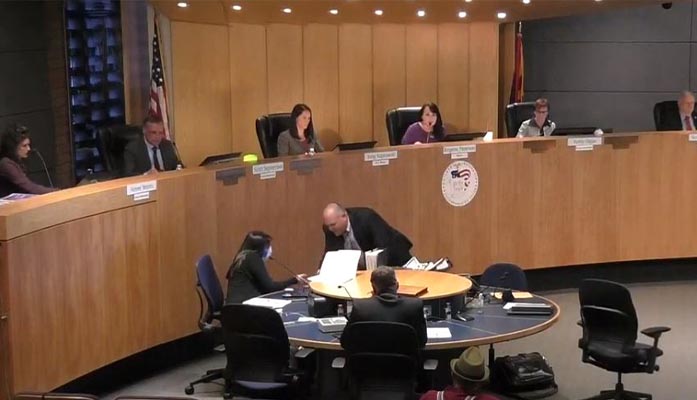
by Corinne Murdock | Apr 5, 2021 | News
By Corinne Murdock |
According to Mayor Brigette Peterson, the Gilbert Town Council should reconsider offering $75,000 of taxpayer money annually for employee sex changes. The motion failed in a council meeting last week. After the vote, Peterson indicated that the sex change surgery – referred to as ‘gender-affirming surgery’ – would return to committee for review in the future.
Currently, the town benefits cover therapy and hormone treatments.
Councilmember Aimee Yentes spoke up first on the issue. She said she supported the 3 percent premium increases, but not the sex change surgery.
“I think those are policies that deviate from other positions we’ve taken as a community that delve more into social policy rather than strictly providing medical[ly] necessary benefits to our employees,” said Yentes.
Vice Mayor Yung Koprowski only spoke up to mention she’d vote for adding sex change surgery coverage only to align with Affordable Care Act (ACA) industry standard.
Councilmember Scott September said he concurred with Yentes’ assessment.
The question of necessity for such coverage came into play. Councilmember Laurin Hendrix asked the human resources representative, Deputy Chief People Officer Kristen Drew, if any applicants within the past 5 years had refused to apply for or accept employment because the town didn’t offer sex change surgery coverage.
Drew said there hadn’t been any such applicants.
Despite this history, the mayor claimed that not offering this surgery would be a deal breaker for employees in the future. She also urged the council to be more open-minded, to set aside their own values.
“At some point, it might become an issue and we’ll show that this community is forward-thinking, and there are times that we need to make the tough decisions that may not always align with our own thought process when it comes to our personal choices or our political choices or our religious choices, even but we put Gilbert in a position that provides for whatever the future may hold[,]” said Peterson. “I’m going to encourage our council members to be open-minded in this benefit and look to this community moving forward where we can be strong and handle situations like this that come forward and we’re faced with.”
In an interview with AZ Free News, Hendrix raised several points of contention about the added coverage and the mayor’s perspective. He stated that a sex change surgery is cosmetic – not a true health need.
“I see health insurance for health needs. And I don’t see this as a health need. It’s a cosmetic surgery by choice. I don’t see any reason that taxpayers should have to pay for that,” said Hendrix. “They were comparing it to autism syndrome at the meeting. You don’t wake up in the morning and think [you have autism]. That’s not something where you have a choice. The two are not similar.”
Hendrix said he doesn’t have an issue with people having the surgery. Rather, Hendrix said he doesn’t want taxpayers to have to foot the bill for it.
Further, Hendrix assessed that this benefit could be an incentive for people to take an underemployed job just for the surgery – and then leave after they got it.
It was Peterson’s request to council before the vote that stuck out to Hendrix the most.
“The mayor’s comments at the end were shocking. We have to ‘get past’ our moral values, our standards? But what else would I base my vote on, if I’m going to put aside my family values, my moral values, religious values, or personal standards? What’s my vote based on? What’s left? I gotta base my vote on something,” said Hendrix. “I hope she bases her vote on something other than who paid into her campaign.”
Councilmembers voted unanimously for the 3 percent premium increases, but the motion to add sex change surgery coverage failed 4-3. Yentes, September, Hendrix, and Scott Anderson voted against the measure. The Vice Mayor, Mayor, and Councilmember Kathy Tilque voted for it.

by Corinne Murdock | Apr 3, 2021 | Education, News
By Corinne Murdock |
After House passage, a bill to require teachers to hold back any K-4 students if they don’t meet promotional criteria was withdrawn. It was scheduled to appear before the Senate Appropriations Committee on Wednesday.
State Representative John Fillmore (R-Apache Junction) was the legislation sponsor. The bill would have required school boards to enact policies and procedures with teeth to enforce these changes.
However, the bill had major exceptions to the rule it sought to establish.
The bill would have allowed any third graders who were English language learners (ELL), experiencing a special education referral or evaluation, diagnosed with a “significant reading impairment” or disability to progress to the fourth grade without meeting criteria, or receiving intervention and remedial services. The exceptions would have also extended to any third grader who demonstrated “sufficient reading skills” or “adequate process” toward third grade reading standards.
Third grade is likely emphasized in this bill because it’s largely acknowledged as a critical progression point for children in their literacy. However, these exceptions wouldn’t have applied to third graders only.
The bill would have extended similar exceptions to first through fourth graders if they were given a special exception by the district’s governing board, an ELL, in the process of special education referral or evaluation, or diagnosed with a “significant reading impairment” or disability.
The House had passed it originally, with amendments, back in February along party lines.
Democrats opposed to the bill said that it would make students more likely to drop out and end up as criminals. They accused the bill of simply “failing” and “forced flunking” of students.
Certain studies have challenged that narrative. 2017 research from Harvard indicated that holding students back in the third grade didn’t increase their likelihood of dropping out of high school.
Republicans in support of the bill responded in kind.
“That’s the key word: what they need. What they need is education. They need to be able to prepare to go forward,” said State Representative Kevin Payne (R-Peoria). “If they’re being pushed along without the proper knowledge, that’s setting them up for failure. We’re not failing them, we’re holding them back. There’s a big difference.”
Fillmore ran a similar bill last year, one that would’ve extended to all grade levels.
Notes on the bill indicate that it was withdrawn from committee last week.Corinne Murdock is a contributing reporter for AZ Free News. In her free time, she works on her books and podcasts. Follow her on Twitter, @CorinneMurdock or email tips to corinnejournalist@gmail.com.

by Corinne Murdock | Apr 2, 2021 | News
By Corinne Murdock |
A bill proposing to strengthen election integrity was withdrawn from a Senate committee this week, after passage in the House. It was introduced by State Representative Jake Hoffman (R-Queen Creek).
The bill would have prohibited any government officials from changing election-related dates, on the threat of a class 6 felony. Specifically, no state officers or agents, political subdivisions, or agencies could modify deadlines, filing dates, submission dates, or any other statutory election dates.
Class 6 felonies are the least harsh of all felonies, and may entail a year’s prison time.
The bill passed the House in a close, party-line vote 31-29.
An amendment to the bill would provide an exception to the proposed bill if a court ruling were to come into play. However, it would prohibit election officials from agreeing to modify deadlines and other election-related dates as part of a settlement agreement.
Last year, the state saw a spike of over 52,000 voters added to the rolls after an 18-day extension for voter registration. The initiative was cut short after a federal appeals court ordered the extension to end over a week early. Even with the order, the court allowed citizens a two day grace period to continue registering.
The challenge to the extension largely arose from the additional burdens that such an extension caused to local election officials. The extension would have allowed voters to register up to a little more than one week out from Election Day. In the past, election officials had nearly a month before the election to process registrants.
Currently, the state is pending an audit for the 2020 election. The audit would focus on Maricopa County, where The Senate hired four companies to review around 2.1 million Maricopa County ballots. Last November, the Senate issued subpoenas for all county ballots and voting machines for another audit. A federal judge ruled that the county didn’t have to comply with that request, since the Senate had improperly filed it.
Once the Senate refiled, legislators and county officials engaged in a heated battle over transparency. The judge quickly ruled on the side of the Senate.
It is unclear the reason for the bill’s withdrawal. Following the 2020 election, Hoffman was banned from Twitter and Facebook.
Corinne Murdock is a contributing reporter for AZ Free News. In her free time, she works on her books and podcasts. Follow her on Twitter, @CorinneMurdock or email tips to corinnejournalist@gmail.com.

by Corinne Murdock | Mar 29, 2021 | Education, News
By Corinne Murdock |
Phoenix – According to their proposed fee increases, Arizona State University (ASU) has determined that a master’s in Gender and Women’s Studies should be more affordable than most other graduate programs.
ASU’s Gender and Women’s Studies students face a mere $80 increase. Other masters programs face increases up to hundreds of dollars higher. On the low end, Crime Analysis bears a $100 fee increase. On the high end, students wishing to receive their master’s in either Accountancy or Taxation must pay $1,000.
The new tuition schedules indicate that millions in federal COVID relief dollars weren’t enough for Arizona’s three public universities.
In December, Governor Doug Ducey gave $115 million of the Coronavirus Aid, Relief and Economic Security Act funds to the state’s three universities. Both the University of Arizona (UArizona) and ASU received $46 million, and Northern Arizona University (NAU) received $23 million.
From the Joint Legislative Budget Committee:
Higher Education Emergency Relief Fund ($736 million): Federal Funds are distributed directly to institutions of higher education (IHEs). Arizona IHEs received $304 million from COVID 3. Of this amount, approximately $122 million went to public universities, $82 million to community colleges, and $101 million to private institutions. So far, Arizona IHEs have been allocated $432 million from COVID 4 and are expected to receive additional funds. Of the $432 million, $198 million will be distributed to public universities, $167 million to community colleges, and $67 million to private institutions. For both COVID 3 and COVID 4, some of these monies must be used for student grants, while the remainder may be used to offset revenue shortfalls. For public universities, a total of at least $118 million must be distributed as student grants. COVID 3 monies must be spent by September 30, 2022, and COVID 4 monies by September 30, 2023.
It is unclear what university expenditures necessitated fee increases, especially considering that students attended virtually during the pandemic.
Concerning the new tuition schedules, ABOR emphasized that none of the three proposals included any tuition increases. However, ABOR didn’t say anything about increased program fees.
ABOR Chair Larry Penley said in a press release that the new tuition schedules created by the university presidents “reflects our commitment to ensuring an affordable education even as our institutions experience fiscal challenges wrought from the pandemic.”
That commitment looks like an $80 program fee for an online Master of Arts degree in Women and Gender Studies, compared to a $1,000 per semester program fee increase for Master of Accountancy students.
It is unclear if the decision to increase program costs correlates to the anticipated earnings associated with a field. In those two examples, the average salary for a Women and Gender Studies graduate is $56,233, whereas the average salary for an individual with a Masters In Accountancy is $71,899.
Despite the massive amount of federal dollars, the proposals submitted by the three presidents also included changes to college fees, program fees, class fees, and meal and residence hall rates.
Here are what the increased costs include at one of the universities, ASU:
College of Health Solutions
- Doctor of Audiology: $800/semester program fee increase
- MS Communication Disorders: $1,700/semester program fee increase
- MS Nutritional Science (Dietetics) – Online: $45/credit hour program fee increase
- MS Strength and Conditioning: $2,500/semester – new program fee
Edson College of Nursing and Health Innovation
- MS Regulatory Science: $2,000/semester – new program fee
Hershberger Institute for Design and the Arts
- M of Architecture ; M of Visual Communication Design ; M of Industrial Design ; M of Interior Architecture ; M of Landscape Architecture ; M of Urban Design: $575/semester program fee increase
- MS in Architecture: $875/semester program fee increase
- MS Design in Industrial Design, Interior Architecture, Visual Communication Design: $500/semester program fee increase
Sandra Day O’Connor College of Law
- Master of Human Resources and Employment Law: $725/credit hour – new program fee
- Master of Human Resources and Employment Law (Online): $658/credit hour – new program fee
The College of Liberal Arts and Sciences
- MA Women and Gender Studies (Online): $80/credit – new program fee
Thunderbird School of Global Management
- MA Global Affairs and Management: $489/credit hour program fee increase
- MA Global Affairs and Management (Executive): $489/credit hour program fee increase
Watts College of Public Service and Community Solutions
- MS Crime Analysis: $100/credit hour – new program fee
- MA Policy Advocacy (Online): $100/credit hour- new program fee
W.P. Carey School of Business
- Graduate Certificate in Marketing (Online): $375/credit – new program fee
- Graduate Certificate in Real Estate: $375/credit – new program fee
- Master of Accountancy: $1,000/semester program fee increase
- Master of Taxation: $1,000/semester program fee increase
Linked here are the NAU and UArizona proposed program fee increases.
Corinne Murdock is a contributing reporter for AZ Free News. In her free time, she works on her books and podcasts. Follow her on Twitter, @CorinneMurdock or email tips to corinnejournalist@gmail.com.

by Corinne Murdock | Mar 26, 2021 | News
By Corinne Murdock |
Earlier this month, the Arizona Board of Psychologist Examiners failed in their attempt to punish a psychologist seeking her license under the universal licensing law.
Dr. Carol Gandolfo applied to practice after the landmark legislation passed in April 2019. The board denied Gandolfo’s application, as well as four others. They claimed that Gandolfo didn’t qualify under the law because she’d moved to Arizona before the law was enacted. Since she didn’t qualify for the protections of the universal licensing law, the board used old licensing standards to claim that her degree was insufficient because it wasn’t from a regionally-accredited school.
The Goldwater Institute stepped in on Gandolfo’s behalf to fight the board. This caused the board to reverse its decision on how they’d interpreted the law in her case and the four others. However, the board decided it wasn’t done with Gandolfo.
The board opened up an investigation in a furthered attempt to deny her a license. They characterized Gandolfo’s volunteer activities with groups like law enforcement and first responders as unlawful. In doing so, they accused her of practicing without a license.
However, those accusations didn’t stick. After some months of investigating into Gandolfo, the board submitted a nonpunitive letter acknowledging that Gandolfo didn’t engage in any wrongdoing.
Now, nearly two years after initial passage of the law, Gandolfo has been cleared to receive her license to practice.
The Goldwater Institute issued a statement on the board’s decision to close their complaint.
“At a time when more Arizonans are in need of mental health services, the Board should focus on allowing respected professionals to provide those services,” stated the Institute. “The Board’s decision today allows Dr. Gandolfo to get back to providing the care she is trained and experienced to provide, and it assures other Arizonans that they can practice their professions free from arbitrary restraints of occupational licensing boards.”
Licensing boards have proved to be a double-edged sword for businesses. Proponents for expanded boards focus on the potential protections it can offer the consumer by preventing inadequate, harmful, improper, or dangerous practices, they argue.
Proponents for limited boards – or, no boards at all in some cases – argue that they stymie healthy competition, which also impacts the cost to both consumers and businesses. They also argue that they establish barriers between an individual and their profession.
Just before the onset of the COVID-19 nationwide health emergency last February, the Goldwater Institute noted that over 750 businesses benefited from the new universal licensing law. In June – several months into the pandemic – nearly 1,200 individuals gained their Arizona license under the law.
At the time of that report, several hundred other individuals had filed their applications. Only 16 were rejected out of all those who filed. 12 of those rejected applications had nothing to do with credentials, however. The individuals merely failed on the technicalities of residency requirements. A board official clarified that those applicants weren’t ultimately considered rejections because they reapplied for a standard license.
Corinne Murdock is a contributing reporter for AZ Free News. In her free time, she works on her books and podcasts. Follow her on Twitter, @CorinneMurdock or email tips to corinnejournalist@gmail.com.





